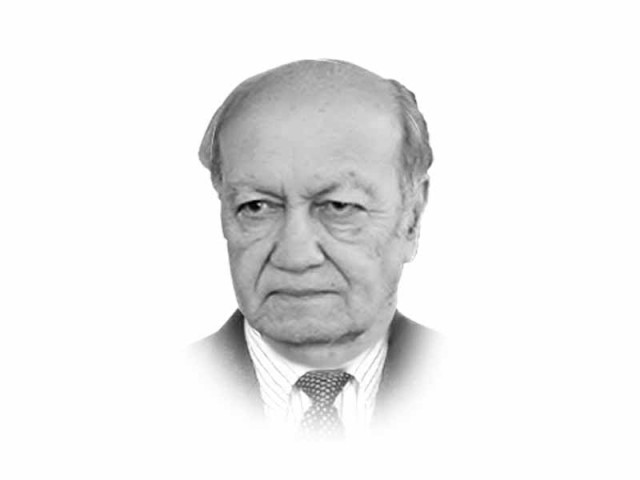Stabilising the state
Perhaps, the best course to stabilise the situation would be for government to announce a date for early elections.

As institutional and individual skeletons are being dragged out of the closet, the few idols and iconic structures that we still had faith in are crumbling one by one. The chief justice, who remains the last bastion of justice, is facing embarrassment due to his son’s misdeeds. The DHA–Bahria contract has turned out to be a scam of mammoth proportions. And erstwhile prime minister Yousaf Raza Gilani, after remaining in the eye of the storm, was disqualified on the Supreme Court’s orders, which indeed was an earth-shaking event. These are not isolated cases but part of a broader, deeper malaise that afflicts the nation.
As our crisis worsens, no institution can pretend to be sacrosanct and above board unless it really is. And no individual or institution — the judiciary, military, politicians, business tycoons or the media — can claim immunity against accountability anymore. The forces released by the information technology revolution and a highly interconnected world have broken the barriers that once ensured some degree of impunity. Moreover, the concept that some institutions are more equal than others, or more worthy of respect, is also progressively being demolished.
These are not ordinary changes in the Pakistani environment, where too many still take it for granted that anyone can be bought out with money or power. Moreover, these developments are good for Pakistan in the long-term because our greatest weakness has been the duplicity in our behaviour — not applying the same standards to oneself that we demand from others. Just as market forces bring about corrections to economies in distress, so our institutions and society as a whole are finding self-correcting mechanisms to check failing institutions and individuals. We are now witnessing institutions — autonomously or in concert — apply checks and balances on one another: the moment one institution becomes too powerful it is likely to be checkmated. In the process, these institutions and their leaders, too, often play politics and advance their own narrow interests.
The challenge we face as a country is clear: how do we keep Pakistan in a fairly stable condition as old power structures collapse and institutions falter? It seems only too likely that the current turbulence could lead to widespread anarchy. Why? Two reasons stand out: our societal transformation is taking place in a leadership vacuum (and those who oppose change have a high stake in maintaining the status quo). Second, no institution has sufficient credibility and moral authority to guide us and show the way forward.
If Pakistan has to break from its past, then it should work for the victory of those forces that truly want to uphold the rule of law and create a society based on merit. The growing pressure for the accountability of institutions from the media — and from every walk of life in this country — should lead to collective introspection and compel the nation to redefine itself. Although rebuilding and redefining institutions is not easy, it is urgently needed. The clock is ticking louder than ever: our economy faces a meltdown, our current political leadership is incapable of taking hard decisions and a failure to act is simply not an option for a nuclear power.
How do we sanitise and transform the state when there is no leadership on the horizon of anything like the stature of a Nelson Mandela? Our dilemma is made worse when the present leadership’s only interest is personal profit that has given rise to a serious crisis of legitimacy. In the past, we took the simplistic approach of inviting the army in when events got out of control. But people are not prepared to accept a replay of that role anymore. Experience has shown that involvement of the military creates more problems than it solves in the long-term. The overreaching role of the judiciary is equally resented (most people would rather have judges provide justice to ordinary people than to play an outsized role in high profile political cases).
Perhaps, the best course to stabilise the situation would be for the government to announce a date for early elections. In the interim, it seems time has come for a caretaker civilian government of technocrats and men of integrity that enjoy the confidence of major political parties and can steer and hold the country through these very challenging times.
Published in The Express Tribune, June 27th, 2012.
















COMMENTS
Comments are moderated and generally will be posted if they are on-topic and not abusive.
For more information, please see our Comments FAQ